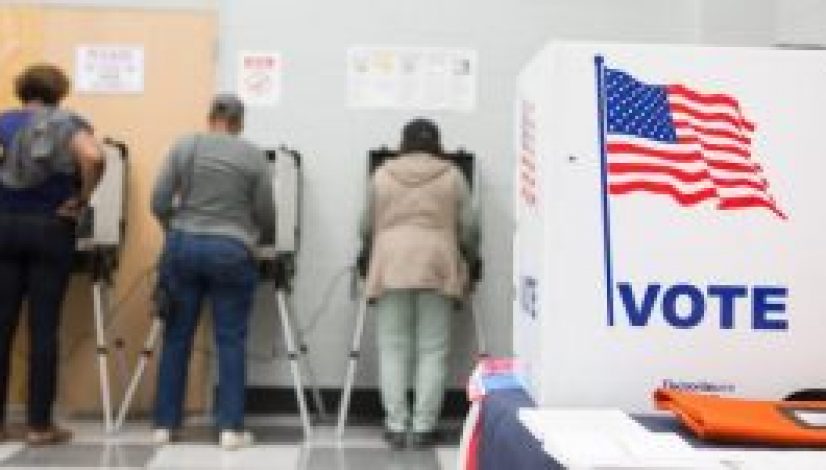Marijuana Reform in the 2018 Midterm Elections
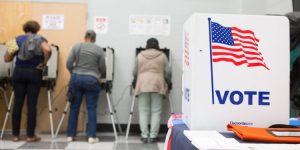 The results are in! Marijuana reform has taken a massive step forward here in the United States after last night’s midterm election results. Click on the links to each state where marijuana reform was being voted upon to read about the issue and see the results.
The results are in! Marijuana reform has taken a massive step forward here in the United States after last night’s midterm election results. Click on the links to each state where marijuana reform was being voted upon to read about the issue and see the results.
Eastern Time Zone
- Connecticut
- Florida
- Georgia
- Maine
- Maryland
- Massachusetts
- Michigan
- New Hampshire
- Ohio
Central Time Zone
- Illinois
- Minnesota
- Missouri
- North Dakota
- Texas
- Wisconsin
Mountain Time Zone
- Idaho
- Utah
Pacific Time Zone
- California
Democrat Ned Lamont is running against Republican Bob Stefanowski in Connecticut’s gubernatorial race. Neither man is an opponents to marijuana legalization but only Lamont has made it a focal point of his campaign. Candidate Lamont believes the estimated $30 million in tax revenue that marijuana legalization could provide Connecticut could really help battle its current budget crisis.
(D) Ned Lamont has been declared the winner in the Connecticut gubernatorial race. Ned Lamont will work to legalize adult-use marijuana in Connecticut.
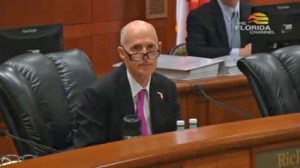 Governor Rick Scott
Governor Rick Scott
Florida is seeing multiple very expensive campaigns being run. The biggest race is for governor. We will start with the current governor, Rick Scott. He is leaving the governor’s office and running for the seat of the incumbent democratic senator, Bill Nelson. Senator Nelson is a former astronaut and discovered his support for marijuana legalization earlier this year. The race between the two has been contentious and will likely be very close. Rick Scott has done everything he could to slow the progression of Florida’s medical marijuana program. He instructed the Florida Health Department to appeal two different judge decisions that ruled Florida’s current medical marijuana law violated the state’s constitution. The first ruling was that Florida’s ban on smoking marijuana was unconstitutional. The second ruling deemed the vertical structure for medical marijuana treatment centers is unconstitutional. Florida’s medical marijuana law mandates that a marijuana company grows its own medical marijuana, transports it and sells it. It has limited how much overall business the medical marijuana industry could bring to Florida, and made entering into the medical marijuana industry incredibly expensive. Scott has also done everything in his power to keep convicted felons, who have served their time, from voting. Felony disenfranchisement is a problem nationwide, but it is worse in Florida than any other state. Many of those individuals served time for nonviolent marijuana crimes. Ballot measure 4 on Florida’s ballot would grant convicted felons the right to vote again. There are 1.6 million convicted felons that are not allowed to vote in Florida, more than any other state. Adding that many votes to Florida’s turnout could change its political landscape considerably in the future.
 (R) Ron DeSantis – (D) Andrew Gillum
(R) Ron DeSantis – (D) Andrew Gillum
A big Trump follower is looking to take up where Rick Scott is leaving off. Republican Ron DeSantis was a member of the House of Representatives but resigned his seat to focus on the gubernatorial race. He opposes adult-use marijuana legalization and would likely continue to inhibit the progress of the medical marijuana program. His opponent is Mayor Andrew Gillum out of Florida’s capital, Tallahassee. He supports full legalization of adult-use marijuana in Florida and would loosen up laws considerably surrounding the medical marijuana program. Florida has not voted a democrat into the governor’s seat in over 20 years. According to polls, Andrew Gillum holds just a 2 point lead over Ron DeSantis. It will be interesting to see the results in Florida as it could change much more in the Sunshine state than just its marijuana policy.
Amendment 4 passed in Florida restoring the rights of felons, that have served their sentence, the right to vote again. Many of them served time for nonviolent marijuana crimes.
(R) Ron DeSantis has won the governor seat in Florida. He does not support marijuana legalization.
Senate race between (R) Rick Scott and (D) Bill Nelson is too close to call.
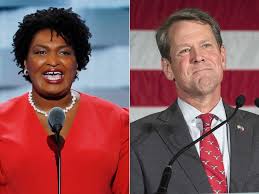 (D) Stacy Abrams – (R) Brian Kemp
(D) Stacy Abrams – (R) Brian Kemp
The very well covered gubernatorial race in Georgia between Democrat Stacey Abrams and Republican Brian Kemp, could not be closer. Stacey Abrams would be the first female black governor the entire country has ever had, and she supports marijuana legalization. The race is tied and both candidates are preparing for a December runoff. If elected, Abrams would work to decriminalize marijuana in Georgia, expand its limited medical marijuana program and establish substance abuse clinics. Once she has completed those tasks, she would pursue legalizing recreational marijuana.
(R) Brian Kemp has a lead against (D) Stacey Abrams but the race is still too close to call. Stacey Abrams would work to bring a lot of marijuana reform to Georgia and eventually adult-use marijuana.
I support decriminalization of marijuana, legalization of medical marijuana and local cultivation of medical marijuana. Once we have established a strong substance abuse network, I am open to legalization for recreational use.
— Stacey Abrams (@staceyabrams) February 21, 2018
In Maine, the current state attorney, Janet Mills, is looking to take over for the current governor, Paul LePage. Governor LePage has blatantly defied Maine voters that approved a measure to legalize adult-use cannabis in 2016. He has vetoed every bill put in front of him by Maine lawmakers to put in place a framework for the commercial sale of cannabis. Janet Mills supports full legalization of marijuana in Maine and would likely give Maine voters what they requested two years ago. Maine is one of the few states where approved referendum questions by voters do not have to become law.
(D) Janet Mills has been elected governor. She will work to create a structured market for the commercial sale of adult-use marijuana in Maine providing voters what they approved in 2016.
While Washington D.C. has legalized adult-use marijuana and is one of the few places in the country that accepts out-of-state medical marijuana cards, the state of Maryland is a different story. Democrat Ben Jealous is running for governor against the republican incumbent, Governor Larry Hogan. Ben Jealous is childhood friends with comedian and marijuana enthusiast, Dave Chappelle, whom he has said convinced him long ago that the end of marijuana prohibition is necessary. If elected, Ben Jealous said he would push for state wide legalization of cannabis and use tax revenue to pay for universal kindergarten.
(R) Incumbent Governor Larry Hogan has kept his position as governor of Maryland. He does not intend to work towards adult-use marijuana legalization.
Massachusetts voters approved recreational marijuana legalization in 2016 but the Cannabis Control Commission has been very slow at licensing and allowing the sale of cannabis. Massachusetts could have started selling adult-use marijuana on July 1st. Democrat Jay Gonzalez has vowed to not only move the commercial sale of cannabis along but also supports having insurance carriers cover the cost of medical marijuana. He faces a tough road running against the incumbent, Governor Charlie Baker.
(R) Charlie Baker has been reelected as governor of Massachusetts
Michigan – Adult-Use Marijuana Proposition 18-1
 If Proposition 18-1 on Michigan’s ballot were to pass, Michigan would be the first Midwestern state to legalize adult-use marijuana. Adults would be able to purchase marijuana flower, edibles and concentrates. Adults would also be able to grow up to 12 plants at home. They could possess up to 10 ounces of marijuana at home and 2.5 ounces in public with no more that 15 grams of it being concentrates. There would be no public consumption allowed. Local municipalities can ban the sale of marijuana if they want to. Michigan has been dealing with a problematic medical marijuana program and support is strong for the passage of Proposition 18-1. There are currently 9 states that have legalized adult-use marijuana, if you want to count Maine, so Michigan would be the 10th.
If Proposition 18-1 on Michigan’s ballot were to pass, Michigan would be the first Midwestern state to legalize adult-use marijuana. Adults would be able to purchase marijuana flower, edibles and concentrates. Adults would also be able to grow up to 12 plants at home. They could possess up to 10 ounces of marijuana at home and 2.5 ounces in public with no more that 15 grams of it being concentrates. There would be no public consumption allowed. Local municipalities can ban the sale of marijuana if they want to. Michigan has been dealing with a problematic medical marijuana program and support is strong for the passage of Proposition 18-1. There are currently 9 states that have legalized adult-use marijuana, if you want to count Maine, so Michigan would be the 10th.
Michigan has passed Proposition 18-1 and legalized recreational marijuana.
The democratic candidate for governor in New Hampshire is Molly Kelly who says she wants her state to join the rest of New England in legalizing marijuana. The state’s slogan is Live Free or Die after all. She is running against the Republican incumbent, Governor Chris Sununu, who passed legislation decriminalizing marijuana but does not support legalization.
(R) Chris Sununu has been reelected as the governor of New Hampshire. He does not support marijuana legalization.
 If State Issue 1 were to pass in Ohio, certain marijuana related felonies would be reduced to misdemeanors with no jail time for first and second time offenders within 24 months of each infraction. Passage of the measure would also reduce prison time for those convicted of nonviolent marijuana crimes as long as they had completed rehabilitation treatment. Ohio is working with a limited medical marijuana program and some counties are looking to decriminalize possession of small amounts of cannabis. Ohio’s efforts to correct the social injustice of marijuana prohibition may make State Issue 1 the most progressive measure on any of the ballots, though we will get to North Dakota shortly.
If State Issue 1 were to pass in Ohio, certain marijuana related felonies would be reduced to misdemeanors with no jail time for first and second time offenders within 24 months of each infraction. Passage of the measure would also reduce prison time for those convicted of nonviolent marijuana crimes as long as they had completed rehabilitation treatment. Ohio is working with a limited medical marijuana program and some counties are looking to decriminalize possession of small amounts of cannabis. Ohio’s efforts to correct the social injustice of marijuana prohibition may make State Issue 1 the most progressive measure on any of the ballots, though we will get to North Dakota shortly.
Ohio did not pass State Issue 1.
 Ashley Surin
Ashley Surin
In Illinois, the incumbent Governor Bruce Rauner has come a long way in terms of his perspectives on cannabis legalization. At one point he was a staunch opponent to any sort of marijuana legalization, but earlier this year he signed Ashley’s Law which allows public school students to have medical marijuana administered to them while on public school property. The law flies in the face of federal law, however Rauner still opposes the legalization of recreational marijuana in Illinois. His opponent is the democratic candidate, J. B. Pritzker, who fully supports the legalization of marijuana and ending the social injustice of marijuana prohibition. The Libertarian party candidate, Kash Jackson, would also legalize cannabis and both would expunge records and grant clemency for nonviolent marijuana related crimes. Nearly 70% of adults in the city of Chicago support marijuana legalization.
J. B. Pritzker has won the governor seat of Illinois, He we will work to legalize adult-use marijuana in Illinois.
Minnesota is facing a tough gubernatorial race as well. The democratic candidate is Tim Walz and he would legalize marijuana for adults and plans on raking in the tax dollars. His opponent is Republican Jeff Johnson who is a lot like Ron DeSantis in Florida. A fully backed candidate by President Trump. At most, he would expand Minnesota’s medical marijuana program, but has no intention of legalizing adult-use marijuana.
(D) Tim Walz has been elected governor of Minnesota and plans on pushing for adult-use marijuana legalization.
The Show Me State? Well Missouri has three different ballot measures having to do with medical marijuana. If that does not show you how badly the fine people of Missouri want access to cannabis, then we don’t know what would. All of the measures are very focused on using tax revenue to fund healthcare for veterans. Amendment 2 on the ballot would create a medical marijuana program in Missouri that mirrors many other state medical marijuana programs. It would place a 4% tax on medical marijuana sales. Amendment 3 was written by a local attorney and physician, Brad Bradshaw, and would put a 15% tax on medical marijuana sales to take care of veterans and also fund a research and drug facility run by Bradshaw. Everyone seems to be assuming Bradshaw has some plan to financially benefit from the institute. Lastly is Proposition C, which would be an entirely new law granting patients access to medical marijuana with a 2% tax. However, this proposition was written by a lobbyist who will not tell anyone who funded it. The assumption seems to be that the people of Missouri will pick Amendment 2 on the ballot.
Missouri voters have passed Amendment 2 which will create a permissive medical marijuana program for the Show Me State.
North Dakota – Adult-Use Marijuana Measure 3
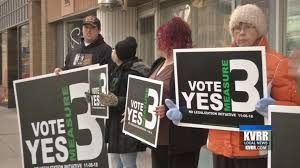 If North Dakota voters pass Measure 3, they would legalize adult-use marijuana and remove it as a Schedule 1 substance. North Dakota is a deep red state, so if the measure passes it could influence other conservative states in future elections concerning marijuana. Politically conservative states have been the most reluctant to embrace legalization so far. The ballot measure is structured so that anyone that is 21 years of age or older could possess and grow as much marijuana as they want at their home. The measure would also automatically throw out the records of anyone that had been convicted of a nonviolent marijuana crime. If anyone’s record did not end up expunged, the measure also creates an easy appeal process for any missed nonviolent marijuana crime convictions. On the surface, North Dakota’s Measure 3 looks like a dream to any marijuana legalization advocate, except that it does not establish a regulated market and the taxing of cannabis sales.
If North Dakota voters pass Measure 3, they would legalize adult-use marijuana and remove it as a Schedule 1 substance. North Dakota is a deep red state, so if the measure passes it could influence other conservative states in future elections concerning marijuana. Politically conservative states have been the most reluctant to embrace legalization so far. The ballot measure is structured so that anyone that is 21 years of age or older could possess and grow as much marijuana as they want at their home. The measure would also automatically throw out the records of anyone that had been convicted of a nonviolent marijuana crime. If anyone’s record did not end up expunged, the measure also creates an easy appeal process for any missed nonviolent marijuana crime convictions. On the surface, North Dakota’s Measure 3 looks like a dream to any marijuana legalization advocate, except that it does not establish a regulated market and the taxing of cannabis sales.
North Dakota did not pass Measure 3 to legalize adult-use marijuana.
In Texas, Democratic Representative Beto O’Rourke is trying to take the incumbent, Senator Ted Cruz’s seat. Cruz says he supports states rights to decide but is not in support of marijuana legalization. O’Rourke wants full on marijuana legalization in Texas. Marijuana is not a top priority in Texas and obviously as a senator, O’Rourke would have not as much influence on state policy as the governor. But, it is worth watching anyways.
(R) Ted Cruz keeps senate seat – will not vote to legalize marijuana
In the cities of Racine and Waukesha, along with 16 counties, voters will tell Wisconsin lawmakers just how badly they want marijuana legalized. If the votes go the way of marijuana reform, we could see Wisconsin lawmakers drafting a new cannabis bill during the next session.
The majority of voters in Wisconsin believe marijuana prohibition should end after results came in. The legislature may begin the process of drafting a bill to bring both medical and adult-use marijuana to Wisconsin.
Idaho has a gubernatorial race happening as well. Republican candidate Brad Little opposes legalizing marijuana except for CBD oil for epileptic patients. His opponent is the democratic candidate, Paulette Jordan. She supports the full legalization of marijuana having recognized the financial benefits of cannabis legalization seen by other states. She would first focus on bringing medical marijuana to Idaho and decriminalizing cannabis.
(R) Brad Little has been elected governor of Idaho. He does not intend on legalizing either medical or adult-use marijuana.
If Proposition 2 passes in Utah, then patients will be able to access all sorts or medical marijuana products and grow up to six plants. Utah has tried to pass medical marijuana legislation in the past but it just has not worked. Polls show that nearly 80% of adults in Utah want access to medical marijuana, so Governor Gary Herbert has vowed to force the legislature to pass a medical marijuana bill even if Prop. 2 does not pass. Utah is surrounded by adult-use states in Colorado and Nevada. So, the people of Utah have been able to fairly easily access cannabis when they have wanted it, but crossing state lines with cannabis is a federal offense. Utah State Senator Jim Dabakis was in Las Vegas a couple of weeks ago and ate a marijuana edible on Facebook Live stating that he figured at least one Utah state lawmaker should try marijuana before voting on it.
It looks like Utah will pass Proposition 2 to expand the medical marijuana program, 53% to 47%. However results are not official.
Californians will be voting on 80 different initiatives that will either impose taxes on cannabis sales or loosen up laws for marijuana businesses. California began selling adult-use marijuana in a regulated market at the beginning of the year.
California voted for marijuana reform and elected (D) Gavin Newsome as governor. He will likely loosen up a lot of policy in California allowing the marijuana industry to flourish.
The amount of early voting ballots cast for this year’s midterm elections exceeded the early vote count for the 2014 midterm elections by over 8 million votes. There are 33 states that allow early voting plus Washington D.C., and so far, over 35 million votes have already been cast compared to the early voting from four years ago of 27 million. In total, over 83 million ballots were cast in 2014 according to ElectProject.org. We will have to see what the total vote count is after today’s election results come in. Midterm elections have always had a lower turnout relative to presidential elections, but voters are plainly driven this year and forecasters are projecting the turnout to rival the very volatile 1960’s midterms. Marijuana reform has taken a front seat in these elections for many voters, and it could be the tipping point for many of the nationwide gubernatorial races.
The United States has 33 medical marijuana states now with Utah and Missouri both voting on medical cannabis. We now have four pro-cannabis legalization governors in office in states that do not currently have an adult-use law in place. Tim Walz of Minnesota, J. B. Pritzker of Illinois, Janet Mills of Maine and Ned Lamont of Connecticut all want to push for legalization of marijuana in their state. If we use New Jersey as an example, once a pro-cannabis governor like Phil Murphy takes office, that does not mean they have an easy path to state legalized marijuana. Almost two years after taking office, Governor Murphy still has not been able to get a bill passed. It is expected to happen soon though. Regardless, pro-cannabis governors being elected still indicates what the future holds for marijuana reform. It seems as though the marijuana legalization movement may have entered into its second stage, where lawmakers will introduce and pass cannabis legalization bills, like Vermont did earlier this year. The 64% of adults that now support marijuana legalization in the US, according to Gallup, may not need to force the issue in the ballot box anymore after these elections.
 Michigan – North Dakota
Michigan – North Dakota
Michigan passed Proposition 18-1 which was its regulate marijuana like alcohol ballot initiative. It is the first Midwest state to legalize marijuana. Michigan legalizing marijuana will place additional pressure on its neighbors. North Dakota failed to pass its adult-use initiative which we had hopes they would after we saw Oklahoma, another very politically conservative state, pass a very permissive medical marijuana law. There is no doubt that the results of this election will affect candidate policies in the 2020 presidential election. Winning over more conservative states would likely end the prohibition of marijuana and force the federal government to deschedule marijuana. If there is strong support from both democrats and republicans for marijuana legalization, then what else is the federal government going to do?
The marijuana legalization movement is about social injustice, expunging records and granting clemency for non-violent marijuana related crimes. It is also about jobs, tax revenue and medicine. If these issues are important to you, then getting out and voting should be a top priority.
Tags
california marijuanaconnecticut marijuanaflorida marijuanaFlorida marijuana electionsgeorgia marijuanaIdaho marijuanaIllinois marijuanamaine marijuanaMarijuana Measure 3marijuana midterm elections 2018maryland marijuanamassachusetts-marijuanamichigan marijuanaMissouri marijuananew hampshire marijuanaNorth Dakota marijuanaohio marijuanapro-cannabis governorsProposition 18-1Proposition 2Stacy Abrams marijuanaState Issue 1Texas Marijuanautah marijuanaWisconsin marijuana

